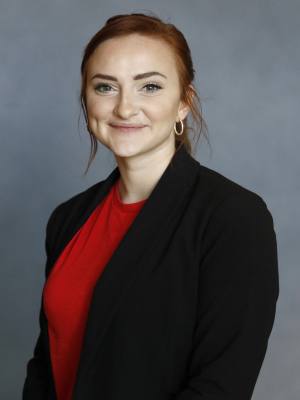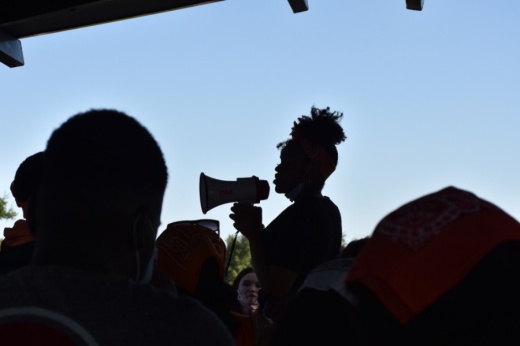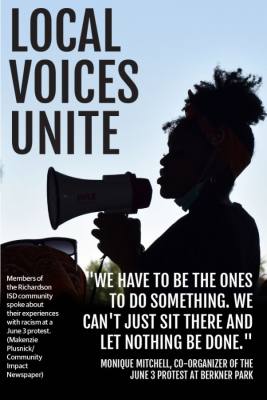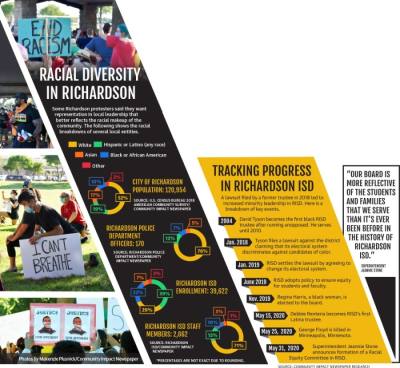The first major demonstration was held June 3 in Berkner Park. A group of current and former Richardson ISD high school students organized the event to honor Floyd and to highlight the racism they have experienced in their own backyards.
“Just because people have not been killed in our area does not mean that we are excluded from the hate that we are experiencing and being shown all over the country,” said Autumn Ray, one of the protest organizers and a recent Berkner High School graduate.
Eighteen months ago, Richardson ISD became the subject of intense scrutiny when a former trustee sued the district on the grounds that its at-large voting system not only favored white candidates but also discouraged minority candidates from seeking election.
After a year of negotiations, the district settled the lawsuit by agreeing to implement a majority single-member district system. One black trustee, Regina Harris, was elected in November.
The additions of Harris and Debbie Renteria, who, in May, became the first Latina woman to serve on the board, are steps in the right direction, Superintendent Jeannie Stone said.
“[Their perspectives are] valuable because our board is more reflective of the students and families that we serve than it’s ever been before in the history of Richardson ISD,” Stone said.
State Rep. Ana-Maria Ramos, D-Richardson, said she believes the city of Richardson and RISD need to do more to diversify and address systemic racism. A good first step would be to hire more minorities in schools, said Ramos, whose District 102 includes part of RISD.
“Reading a couple of policy books and going to a couple of workshops—it’s not enough,” she said. “They need to go into the trenches and really lift up the community.”
The district reacts
In the days following Floyd’s death, Stone announced the formation of a Racial Equity Committee that will strive to make RISD a “more inclusive, anti-racist, multicultural organization.”
This is the logical next step, Stone said, in enforcing the RISD Equity Policy, which was adopted last June and seeks to “eliminate bias, prejudice or unlawful discrimination.”
“The policy is an overt statement of what we want to be as an organization, but now, we have to put action behind the words,” Stone told Community Impact Newspaper. An equity committee is just “the tip of the iceberg” of what needs to happen to heal wounds caused by a history of racism in RISD, Ramos said.
The representative added that district leaders should invest time and effort into “aggressively recruiting” in communities of color so that staff can better empathize with the experiences of students.
According to Stone, efforts have been made to diversify leadership. In her three years as superintendent, the numbers of minority principals and assistant principals have increased, with 45% of school administrators now classified as non-white.
Berkner High School student Isabela Marcano, one of the organizers behind the June 3 protest, said the district needs to incorporate more black history into its curriculum.
“We are teaching kids white history by white teachers,” she said. “That breeds misunderstandings about culture, and it breeds racism. ... I think it’s important that RISD sees that the way they teach kids impacts the way that those kids grow up.”
Several students and faculty members spoke during the Berkner Park protest about their own experiences with racism in the district. Andre Watson, who has taught in the district for seven years, said he would no longer remain quiet about what he has endured, including racist comments made at his expense.
“I was silent. I was complicit. That’s why I have to speak now,” Watson said. “I promise you I will stay in this community and make sure there is change.”
Change at the city level
About 10% of Richardson residents are black or African American, according to the latest estimates from the U.S. Census Bureau. The current makeup of City Council is all white.
“Richardson has not had a [police brutality] incident, ... but we do still believe the city needs more diversity,” said Joel Montfort, an organizer of a June 6 protest put on by the Richardson Area Democrats. “We need attention paid to it. We need some actual mechanics put in place.”
To foster more minority representation in City Council, Ramos suggested the city follow RISD’s lead and switch to a single-member district system.
“I believe our citizens, [who] have elected this City Council in contested elections, want to be able to vote for all of their City Council members and understand that all members live in every corner of this city and represent everyone in the community,” Mayor Paul Voelker said in a statement.
On June 8, Richardson City Council unanimously approved a statement of equality following calls for leaders to take a stand against racism in the wake of Floyd’s death.
“We stand with our community and nation in condemning incidents of violence and unequivocally wish to make clear that racism has no place in our city and society,” the statement read.
The document also reinforces the city’s “steadfast commitment” to maintaining a world-class police department through state-of-the-art facilities and training.
City Manager Dan Johnson said the statement is not intended to substitute words for action.
“I believe we have a very willing and motivated organization that wants to do better,” he said. “I represent them in saying we will meet this mission.”
Richardson Police Chief Jimmy Spivey called the actions of Minneapolis Police Officer Derek Chauvin “appalling” and “disgusting” and said he supports murder charges being brought against him.
Police officers in Richardson are trained to de-escalate encounters verbally before using physical force, Spivey said. Kneeling on a suspect’s neck is never allowed, he said, adding that the department banned chokeholds years ago.
Spivey also said his department respects the public’s right to protest.
“I’m really proud that the Richardson community can come together in these troubled times and express the frustration, anger and sadness we all feel about George Floyd’s death in a peaceful and orderly way,” he said.
Moving forward
The only way there will be a true societal shift, Marcano said, is if people recognize that racism exists everywhere.
“I hope that getting all these people together shows the community that this is a serious issue, and it’s not just going to blow over and go away,” she said.
The district’s Racial Equity Committee is slated to begin work in the fall. At the city level, staff has committed to aggressively reviewing its practices and methods, Johnson said.
Keeping up the momentum created by Floyd’s death is important even in cities like Richardson, where many acts of racism are microaggressions, Ray said.
“This is just the beginning,” Ray said. “This is the first time of many. We won’t stop until change has happened.”








